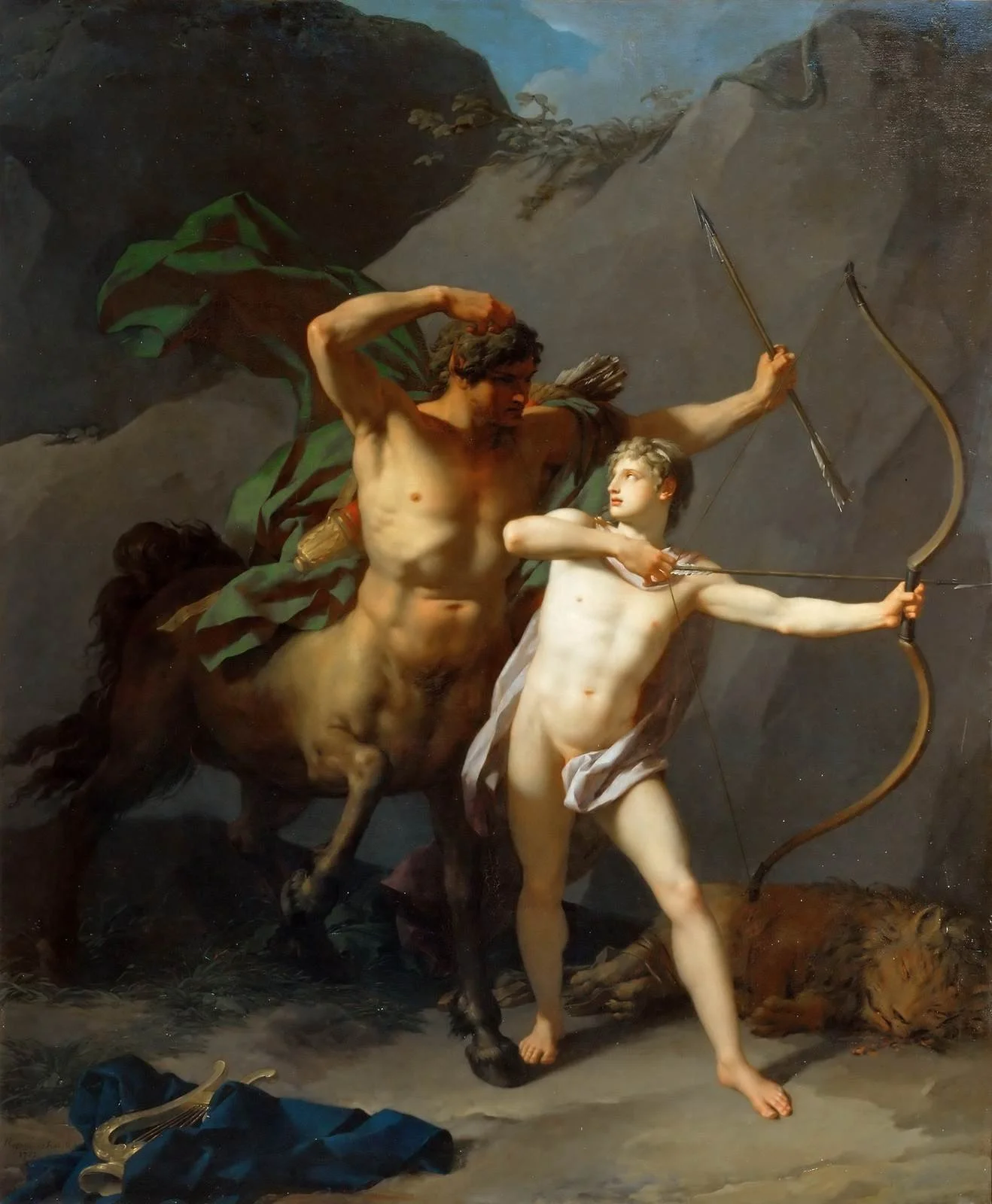On Education
May 1, 2025 | By Isaac Oberman DC ‘26
Jean Baptuste Regnaunt, The Education of Achilles by the Centaur Chiron, 1782
When have I felt like an adult? The first time was when I completed my Eagle Scout project, which required me to plan, fundraise, and lead the building of something independently. Another time came when I was twelve and stood before my church congregation. I gave a confession of faith, affirming that I agreed with the beliefs of the church to become a fully communicant member, ready to receive the sacraments alongside the rest of the members. These instances were not tied to my age; instead, they felt like a quest, where accomplishing something initially intimidating leads to a sense of achievement. Growth was not linear, growth was experiential. The main problem with the classifications of adulthood today is that it is conferred solely upon reaching a threshold of time rather than an establishment of understanding for what it means to be an adult and achieving the status.
So what does it mean to be an adult? To define it against time, adulthood is the state after childhood. It follows then that adulthood results from growth and development, in which one progresses past the state of childhood that one is born into. From here, we have to ask the question: growth and development toward what? Growth and development are ordered toward membership in a community. As Plato firmly stated in The Republic, man is a social animal who is naturally drawn towards life in society with others. [1] Every day, we interact with dozens of humans, from baristas to teachers to coworkers to the person next to us on the street. Maturity is how we learn to constructively interact with other individuals in our society, which is integral to the human experience; it’s something that we expect adults to know, and we teach children to do.
Part of the problem young people face is individualistic traditions around coming into adulthood. Many modern traditions, especially American ones, are centered around the concept of freedom and opportunity. One just has to watch a John Hughes movie to see a theme of teenagers lamenting their trapped existence and longing to be out from under their parents’ thumb. While the idea of freedom is not inherently negative, it is also incredibly individualistic. Graduation and the driver’s test stand out as traditions focused on escape, whether from the rigor of schooling or the ability to leave your safe home and sail new forbidden seas. In some ways, these escapes seem positive: proving yourself worthy to operate a vehicle, or having been declared educated through years of learning. Yet it still seems lacking, as the experience does not offer the child new responsibilities or community.
For example, when a young man or woman graduates from high school, they celebrate the end of their mandatory formal education. However, it is not forward-thinking enough; the celebration is centered on the escape from the woes of boring classes or your awkward first kiss at homecoming. Meanwhile, the adults all wish you good luck on your own as you go to college or join the workforce, a world that the child is usually ill-prepared to exist in. There is no sense that this is your welcoming into the adult world; instead, it is an escape from a childish one. The emphasis rests on the wrong syllable–children aren’t told how to be adults, they are told to stop being children.
One more brutal way we see immaturity play out in modern culture is how kids, in an attempt to be mature, expose themselves to adult activities without the proper mature development. A paper from Duke’s Hart Leadership Program documented a growing disparity between increased sexualization and emotional maturity. Sperling notes how early onset sexualization often leads to psychological trauma in the form of eating disorders or depression. A mischaracterized view of sex as equivalent to maturity leads children into broken adulthoods. [2]
The solution to this quandary of individualism seems tied to something John Paul II says in his encyclical Veritatis Splendor, a discussion of the Catholic Church’s moral teaching. The encyclical focuses mainly on the dichotomy between truth and human freedom, and which proceeds from which. JPII uses a teleology to argue that it is freedom that emanates from truth, and says that because of this, human freedom is ordered to the service of the truth. [3] And here comes the important part: “this service is also directed to all mankind: it is not only for individuals but also for the community, for society as such.” [4] Human society is based upon the bowing of human freedom to the service of the broader community. If adulthood, which we defined earlier as growth ordered toward membership in a community, is to be achieved, it requires learning the skill of service and membership.
The proper solution then seems to be an education in service and membership. These two ends lead to the maturity we discussed earlier, with the end of proper engagement with others. While a full revamp of our education system is too radical to propose and impractical to achieve, perhaps a simpler fix is in reach: celebrating coming of age properly. Find the ceremonies that celebrate service, that celebrate introduction to a large community, and emphasize them. In doing so, we seed a new culture of individual cultivation.
[1] Aristotle. Politics, 1253a.
[2] Melanie Sperling. Early Sexualization of Young Girls and the Emotional Maturity Gap. 2011.
[3] “Because there can be no freedom apart from or in opposition to the truth, the categorical — unyielding and uncompromising — defence of the absolutely essential demands of man's personal dignity must be considered the way and the condition for the very existence of freedom.”
[4] Karol Wojtyła. Veritatis Splendor, section 96. 1993.

